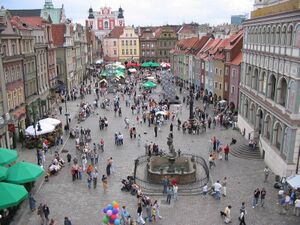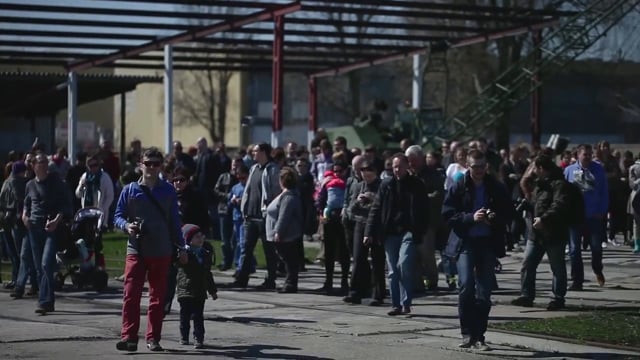
 How Gdańsk is reclaiming its industrial waterfront, The Conversation (May 11, 2023)
How Gdańsk is reclaiming its industrial waterfront, The Conversation (May 11, 2023)
Climate action[edit | edit source]
As of November 2019, 4 local groups, see Map of climate assemblies, climateassemblies.org
Community energy[edit | edit source]
Wind power[edit | edit source]
Wind power is a growing source of electricity in Poland. In 2019, wind was the second most important source of electricity produced in Poland, after coal, accounting for about 10% of the electricity production.
Solar power[edit | edit source]
Solar energy in Poland includes the production of solar thermal energy and solar photovoltaics. By the end of 2021, there were around 3,000,000 square metres (32,000,000 sq ft) of installed solar thermal collectors which in Poland are primarily used for heating up household water.
The total solar photovoltaics (PV) grid-connected capacity in Poland was 17,057.1 MW as of 31 December 2023, comprising almost 59.27% of the country's total installed renewable energy capacity. Growth has been strong; projections anticipate national PV capacity more than doubling from 2022 (12 GW) to 2025 (26 GW). Solar power is key to the Polish government's plan to produce 75% of electricity from carbon-free sources (renewables and nuclear) by 2040.
Cycling activism[edit | edit source]
Environment quality[edit | edit source]
ClairCity, Eu project about air pollution and CO2 emissions in cities, putting the power in the hands of residents to determine the best local solutions.
Rural sustainability[edit | edit source]
International Coalition to Protect the Polish Countryside
Trees, woodland and forest[edit | edit source]
Forests cover an estimated 38.5% of Poland's territory, and are mostly owned by the state. And are increasing at a fast rate by 2035 Polands forest percentage will be 42-46%. Western and northern parts of Poland as well as the Carpathian Mountains in the extreme south, are much more forested than eastern and central provinces. The most forested administrative districts of the country are: Lubusz Voivodeship (60,2%), Subcarpathian Voivodeship (58,2%), and Pomeranian Voivodeship (50,1%). The least forested are: Łódź Voivodeship (36%), Masovian Voivodeship (34,6%), and Lublin Voivodeship (32,8%).
Campaigns: STOP destruction of the Białowieza Forest!
Ecoregions in Poland[edit | edit source]
Poland has a humid temperate climate, and falls within two terrestrial biomes, temperate broadleaf and mixed forests and temperate coniferous forests.
Most of Poland's natural vegetation is deciduous woodlands of the temperate broadleaf and mixed forests biome. Poland has three temperate broadleaf and mixed forest ecoregions:
- The Central European mixed forests ecoregion covers the largest portion of Poland, spanning from Lithuania to Romania, and from Germany to western Russia.
- Northwestern Poland is in the Baltic mixed forests ecoregion, which also includes the Baltic Sea coastal regions of northeastern Germany, eastern Denmark, and southern Sweden.
- The Western European broadleaf forests ecoregion extends into southwestern Poland (PA0445), covering the Polish portion of the Sudetes mountains.
The southeastern portion of Poland, lying in the Carpathian Mountains, is within the Carpathian montane conifer forests ecoregion, part of the temperate coniferous forests biome. W
Urban sustainability[edit | edit source]
Poland: Opening the heart of the city
In the heart of Warsaw, tucked away in the lush green tangles where John Lennon Street meets Jazdów, lies a community of small rural houses. Established by the USSR in 1945 as a part of Finnish war reparations, they form an enticing island of tranquility in the capital's urban landscape, and a living monument to the city's 20th century history. Yet in recent years, city officials have decided that they would rather replace this area with the glass skyscrapers so typical of large city centres. In response to this, social activists responded by organising Otwarty Jazdów (Open Jazdów), a grassroots initiative that includes current and former Jazdów residents, community organizations, local activists and young politicians trying to stop the demolition of the houses by promoting Jazdow as a common space for the city's inhabitants. It is a process that is similar to what activists are doing in the neglected, formerly industrial Ursus district. Starting in 2012, people in this district have been organising actions that criticise the urban decay it has been subjected to, informing the public of residents' unmet needs and promoting the district's history through the bottom-up creation of a Social Museum. As each of these campaigns uses the institutional and grassroots tools at their disposal in their disputes with city officials, Radical Democracy: Reclaiming the Commons will help amplify their message so that they can achieve their goals.[1]
Resources[edit | edit source]
Maps[edit | edit source]
Sustainable energy: Interactive map of #solar installations we've done this year: Instalacje OZE Greenpeace, Greenpeace Polska
News and comment[edit | edit source]
2017
New Municipalism in Poland, Feb 17[2]
2016
Free public transport as smog covers Warsaw, Dec 15[3]
Will no one stop Poland destroying Europe's most precious forest? Apr 3[4]
Polish government backs small farmers' and food sovereignty, January 25[5]
Poland air pollution: Why Krakow's domestic coal ban is a big deal, January 21[6]
2015
Almost everyone in Poland wants more renewables, October 22[7]
2011
Is the world's greatest green roof in Warsaw? Joe Peach, April 21[8]
2010
Clean Up the World weekend 2010: From the Baltic coast to the Kampinoski National Park in east-central Poland, Our Earth Foundation will lead thousands of volunteers in clean up activities across Poland over Clean Up the World Weekend. Our Earth Foundation is celebrating its 17th year as a Clean Up the World participant and is one of over 60 organizations who have been involved with the campaign for more than 5 years.[9] September 15
About Poland[edit | edit source]
Poland, officially the Republic of Poland, is a country in Central Europe. Poland is divided into sixteen voivodeships and is the fifth-most populous member state of the European Union (EU), with over 38 million people, and the seventh-largest EU country, covering a combined area of 312,696 km2 (120,733 sq mi). It extends from the Baltic Sea in the north to the Sudetes and Carpathian Mountains in the south, bordering seven countries. The territory is characterised by a varied landscape, diverse ecosystems, and temperate transitional climate. The capital and largest city is Warsaw; other major cities include Kraków, Wrocław, Łódź, Poznań, and Gdańsk.
Humans have been present on Polish soil since the Lower Paleolithic, with continuous settlement since the end of the Last Glacial Period over 12,000 years ago. Culturally diverse throughout late antiquity, in the early medieval period the region became inhabited by the tribal Polans who gave Poland its name. The process of establishing statehood coincided with the conversion of a pagan ruler of the Polans to Christianity, under the auspices of the Roman Catholic Church in 966. Subsequent territorial expansion led to the creation of the Kingdom of Poland in 1025. By the mid-14th century, Poland became a major European power and began gradually integrating with Lithuania, resulting in the formation of the Polish–Lithuanian Commonwealth in 1569. For the next two centuries, the Commonwealth was one of the great powers of Europe, governed by a uniquely liberal political system that adopted Europe's first modern constitution in 1791.
With the passing of the Renaissance and the prosperous Polish Golden Age in the late 16th century, Poland–Lithuania was weakened by social and political turmoil that led to its partition by neighbouring states at the end of the 18th century. Poland regained its independence at the end of World War I with the founding of the Second Polish Republic. In September 1939, the invasion of Poland by Germany and the Soviet Union marked the beginning of World War II, which resulted in the Holocaust and millions of Polish casualties. Forced into the Eastern Bloc during the global Cold War, the Polish People's Republic was a founding signatory of the Warsaw Pact. Through the emergence and contributions of the Solidarity movement, the communist government was dissolved and Poland re-established itself as a democratic state in 1989.
External links
Wikipedia: The World Wide Fund for Nature in Poland
References
- ↑ Grassroots Economic Organizing, Shared under a CC-BY-NC-SA-3.0 license
- ↑ euroalter.com
- ↑ eltis.org
- ↑ The Guardian
- ↑ The Ecologist
- ↑ @energydesk
- ↑ Energydesk
- ↑ thisbigcity.net
- ↑ unep.org

